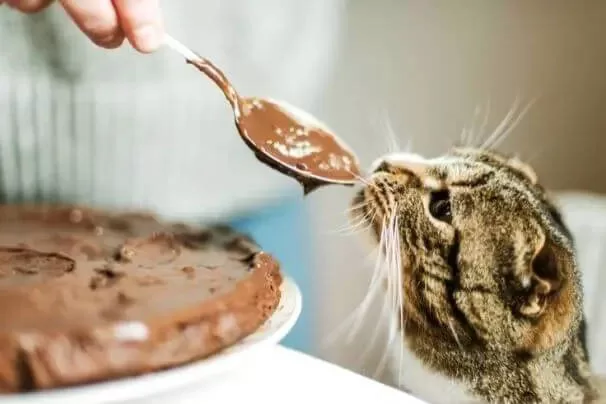Introduction: Cats and Chocolate – Truths
Have you ever heard that cats like chocolate? In fact, this is a common myth. In our today’s article, we’re going to demystify this idea and reveal the truth about our feline friends’ taste buds.
Chocolate may be delicious for us humans, but for cats, it’s another story. This popular treat can be dangerous for your pet. And it’s not just the chocolate! Let’s dive into the world of sweets and find out which ones are safe and which ones should be avoided. So stay tuned to our blog because the truths we’re going to reveal may surprise even the most experienced cat owners!
Understanding Cats’ Selective Taste
Differences Between Human and Feline Taste
It may come as a surprise to some, but a cat’s palate is very different from ours. While we humans have around 9,000 taste buds, a cat only has 470! This means that they are less aware of certain tastes, including sweets.
Cats: Obligate Carnivores
Felines are considered obligate carnivores because they need meat to survive. They cannot get all the necessary nutrients from plants or vegetables like we humans can. Thus, the food they prefer is rich in animal proteins and fats.
The Taste System of Cats
The gustatory system of cats works mainly through smell. They have a special organ called a “Jacobson’s organ” that allows them to “smell” food before tasting it. If something doesn’t smell good to them (like a piece of chocolate), they probably won’t want to eat it.
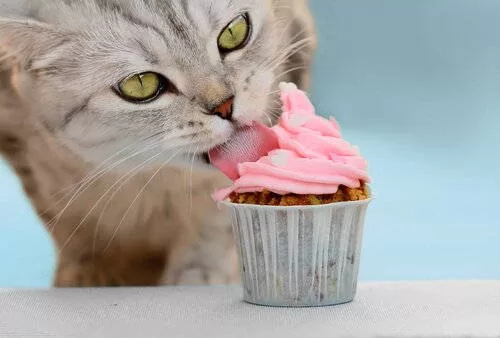
Flavors That Cats Enjoy
In general, cats like flavors that are similar to the prey they would capture in the wild – small rodents, birds and fish. However, this can vary depending on the individual cat and the diet they have been accustomed to since they were kittens.
Now you might be wondering, “But my cat loves candy!” Well, here’s the thing: while your cat might seem interested in your ice cream or cake, he really isn’t enjoying the sweet taste the same way you would.
So why does my cat seem to want my dessert? They are more likely to be curious about the texture or smell of the food. But even so, it’s important to watch for signs of discomfort or illness if you’ve given your cat any kind of sugary food – especially chocolate!
Chocolate contains theobromine, a substance that is toxic to cats (and many other animals). While a small amount is unlikely to harm your pet, large amounts can be dangerous and even lethal.
So the best way is to keep chocolates and sweets out of reach of your feline friends. In some cases where the pet insists on eating something sweet, it is essential to seek a veterinary doctor to find out the best safe options.
Remember: every bit counts when it comes to your pet’s health!
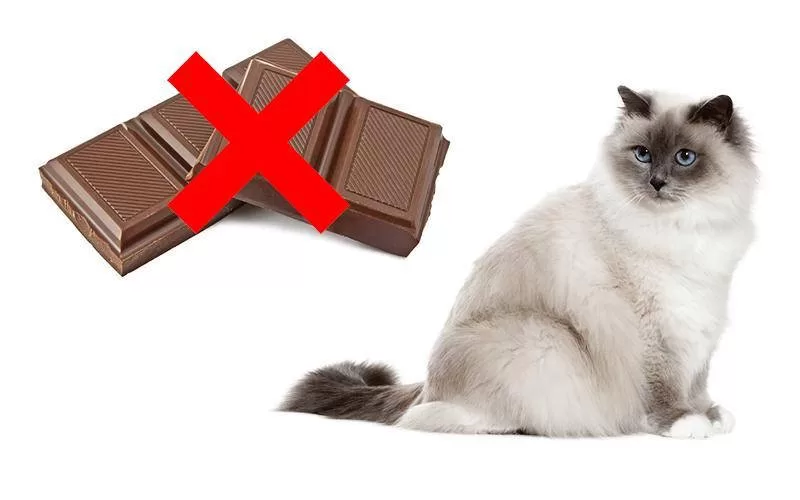
Can Cats Taste Sweet?
Feline Genetic Disability
Cats, unlike us humans, have a genetic inability to detect sweet tastes. This is not a defect, but an evolutionary adaptation. Felines are obligate carnivores and, therefore, their diet is mainly composed of proteins. Sugar is not part of your natural menu.
The absence of the sweet taste receptor in cats is puzzling. This receptor is responsible for detecting sugar molecules in food. However, cats do not have this receptor in their taste buds. This means they can’t taste sweet like we can.
Cats’ Natural Diet
Why are sweets no longer part of a cat’s natural diet? The answer lies in the biology of these animals. They are designed to be efficient hunters and their diet should consist mainly of meat. Foods high in sugar can cause digestive and other health problems in cats.
Here are some examples:
- Diabetes
- Obesity
- dental problems
Why Do Some Cats Seem to Like Sweets?
So why do some cats seem to like sweet foods? Well, this can be explained by the fact that many sweet foods also contain fats or proteins, which are important components of a feline’s diet.
For example, a cake might contain eggs and butter in addition to sugar. Although the cat cannot taste the sugar in the cake, he may still be attracted to the other ingredients in the cake.
In conclusion:
- Cats have a genetic inability to detect sweet tastes.
- Sugar is not part of the cat’s natural diet.
- Some sweet foods contain fats or proteins that can be attractive to cats.
So if you were already thinking about sharing that delicious piece of chocolate with your feline friend – think again! He’ll probably prefer a juicy piece of meat instead.
Dangers of Chocolate for the Health of Cats
Toxic Components in Chocolate
The chocolate we love so much can be extremely harmful for cats. This is because it contains toxic substances such as theobromine and caffeine, which felines cannot efficiently metabolize. This inability results in intoxication, which can lead to serious health problems.
Consequences of Eating Chocolate
The consequences of eating chocolate by a cat are serious and can be fatal. Among them are:
- vomiting
- Diarrhea
- Increased heart rate
- muscle tremors
- seizures
- Renal insufficiency
Small Amounts Are Also Harmful
Anyone who thinks that a small amount of chocolate won’t harm the cat is wrong. Even a small piece can contain a lethal dose of theobromine for a small feline.
Risks of Regular Consumption
Regular consumption of chocolate by cats increases the risk of chronic diseases such as obesity and diabetes, in addition to the aforementioned heart and kidney problems.
In summary, it is essential to avoid giving any amount or type of chocolate to our dear feline friends. Instead, opt for safe, healthy treats designed especially for them.
Remember: taking care of your pet’s food is essential to ensure its health and well-being!
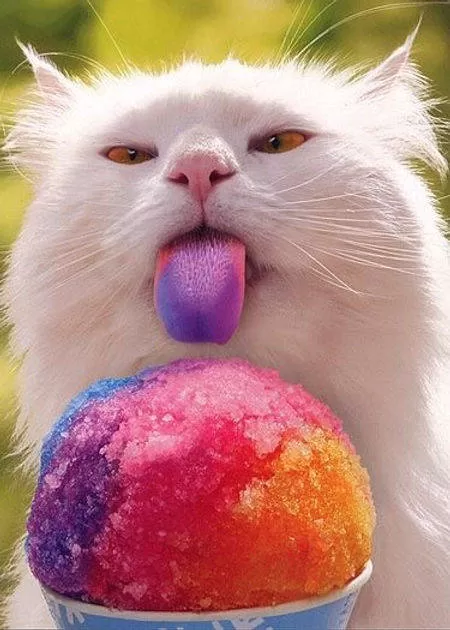
Symptoms of Chocolate Poisoning in Cats
Early Identification of Clinical Signs
Ingesting chocolate can cause a series of problems for our feline friends. They may experience symptoms such as vomiting, diarrhea, increased heart rate, restlessness and even seizures. It is essential to be aware of these signs after your cat has access to any amount of chocolate.
Consequences of Intoxication
Chocolate has a substance called theobromine that is toxic to cats. This toxin can affect the animal’s central nervous system and cardiovascular system, leading to serious neurological and cardiac consequences. In addition, gastrointestinal problems are also common in chocolate poisoning in felines.
Variation in Symptoms
Symptoms may vary depending on the amount consumed and the type of chocolate ingested by the animal:
- Milk chocolate: Contains lower concentration of theobromine but is still harmful.
- Half bitter chocolate: It has a greater amount of theobromine being more toxic.
- Dark chocolate and cocoa powder: These are the most dangerous for cats, as they contain the highest amounts of this toxin.
Immediate Veterinary Assistance
If you suspect that your cat has ingested chocolate, do not hesitate to seek veterinary help immediately. The professional can perform procedures to minimize the absorption of the toxin by the animal’s body and initiate the appropriate treatment.
Remember: we love our pets and always want the best for them! Therefore, avoid leaving chocolates within reach of your cats. Even a small piece can be harmful to his health!
When observing any strange behavior or if you suspect that your pet has ingested a harmful food such as chocolate, do not waste time! See a veterinarian immediately. Quick identification of symptoms can make all the difference in your pet’s prognosis.
Finally, it is worth mentioning that each case is unique and requires an individualized approach. Therefore, only a qualified professional will be able to properly assess the situation and propose the best treatment plan for each specific case.
Actions to Take if Cat Ingests Chocolate
First aid
If your cat eats chocolate, it’s crucial to act quickly. Chocolate poisoning in cats is a serious situation and can lead to severe poisoning. Immediately after noticing that the pet ate chocolate, try to determine the amount ingested. This will be helpful for the veterinarian to assess the severity of the case.
- Keep calm and collect any leftover chocolate that is still within reach of the animal.
- Encourage the cat to drink water to help dilute the caffeine in the chocolate.
- Do not induce vomiting without professional guidance.
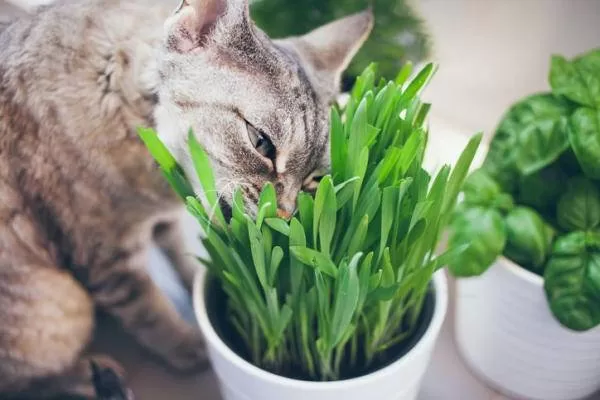
When to Seek Professional Help?
After the episode, look closely for the symptoms of chocolate poisoning in cats:
- Agitation
- wheezing
- muscle tremors
- fast heartbeat
If you notice any of these signs, immediately take your pet to the nearest veterinary clinic.
During Transport
On the way to the clinic, keep your cat stable and comfortable:
- Place it in a secure shipping box.
- Avoid sudden movements that may increase your anxiety or discomfort.
- Try to maintain a calm and quiet environment.
Prevention: How to Avoid Future Incidents?
To avoid a possible recurrence of this incident, follow these preventive measures:
- Keep chocolates and sweets out of reach of pets.
- Educate the children in the household about the dangers of feeding chocolates to animals.
- On special occasions (such as Easter or Christmas), be extra careful with products containing chocolate.
Always remembering that prevention is better than cure! So make sure you take all the necessary precautions to prevent your cat from eating chocolate again in the future.
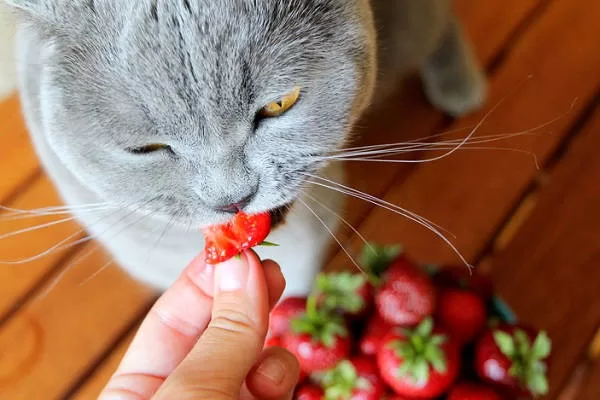
Healthy Food for Cats: Tips
Feline Balanced Diet
To ensure that your cat lives a long and healthy life, it is essential to offer it a balanced diet suitable for its species. This means avoiding harmful human foods such as chocolate and sweets, which is often asked if “do cats like chocolate and sweets?”. The ideal food for a cat should contain an adequate mix of proteins, fats, carbohydrates, vitamins and minerals.
- Protein: Lean meats like chicken or turkey.
- Fats: Fish oil or flaxseed oil.
- Carbohydrates: Brown rice or sweet potatoes.
- Vitamins and Minerals: Fruits and vegetables should be included in small amounts.
Specific Diets for Each Stage of Life
Your cat’s diet should change as it goes through different stages of life:
- Puppies need protein-rich food to support rapid growth.
- Adult cats need a balance of protein, fat and carbohydrates to maintain overall health.
- Senior cats may require special diets if they have specific medical conditions.
Always consult a professional before making any changes to your pet’s diet.
Regular Consultation with the Veterinary Nutritionist
It is crucial to take your cat regularly to the nutritionist veterinarian specializing in pets. This professional will monitor the dietary health of your pet adopted by the modern human family today.
Safe Human Food for Kittens
While most human foods are harmful to cats, there are a few you can occasionally treat them to:
- unseasoned boiled fish
- Boiled meat without salt or seasoning
- Cooked vegetables without butter or oil
Always remember that these are only occasional treats and should not replace a complete and balanced diet specifically designed for the nutritional needs of cats.
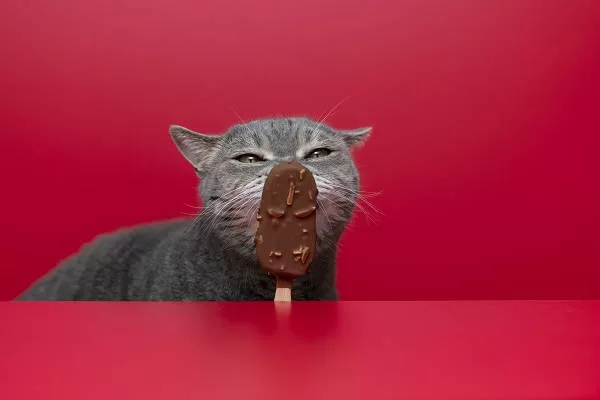
Conclusion: Cats, Chocolate and Sweets – Myths and Truths
So, the truth is that cats cannot taste sweet. They have a selective palate and chocolate is off their list of tastes. However, that doesn’t mean they won’t try to experiment. But be careful! Chocolate is dangerous for the health of cats.
If your cat eats chocolate, it could be poisoned. Symptoms include vomiting, diarrhea and even seizures. If you notice any of these signs, take him to the vet immediately.
To keep your cat healthy, follow our cat feeding tips. Avoid sweets and chocolates and opt for cat-friendly foods.
Now that you know the truth about cats and chocolates, take good care of your furry friend!
Common questions
Can cats eat chocolate?
No, cats shouldn’t eat chocolate. It is toxic to them and can cause serious health problems.
How can I tell if my cat ate chocolate?
Symptoms of chocolate poisoning in cats include vomiting, diarrhea, excessive restlessness and even seizures.
What do I do if my cat eats chocolate?
If your cat ingests chocolate, take him to the vet immediately.
Can cats taste sweet?
No, studies show that felines lack taste receptors for sweet tastes.
What are the best food options for my cat?
The best options are foods specially formulated for cats. These products contain all the necessary nutrients for your pet’s health.
External Links:

